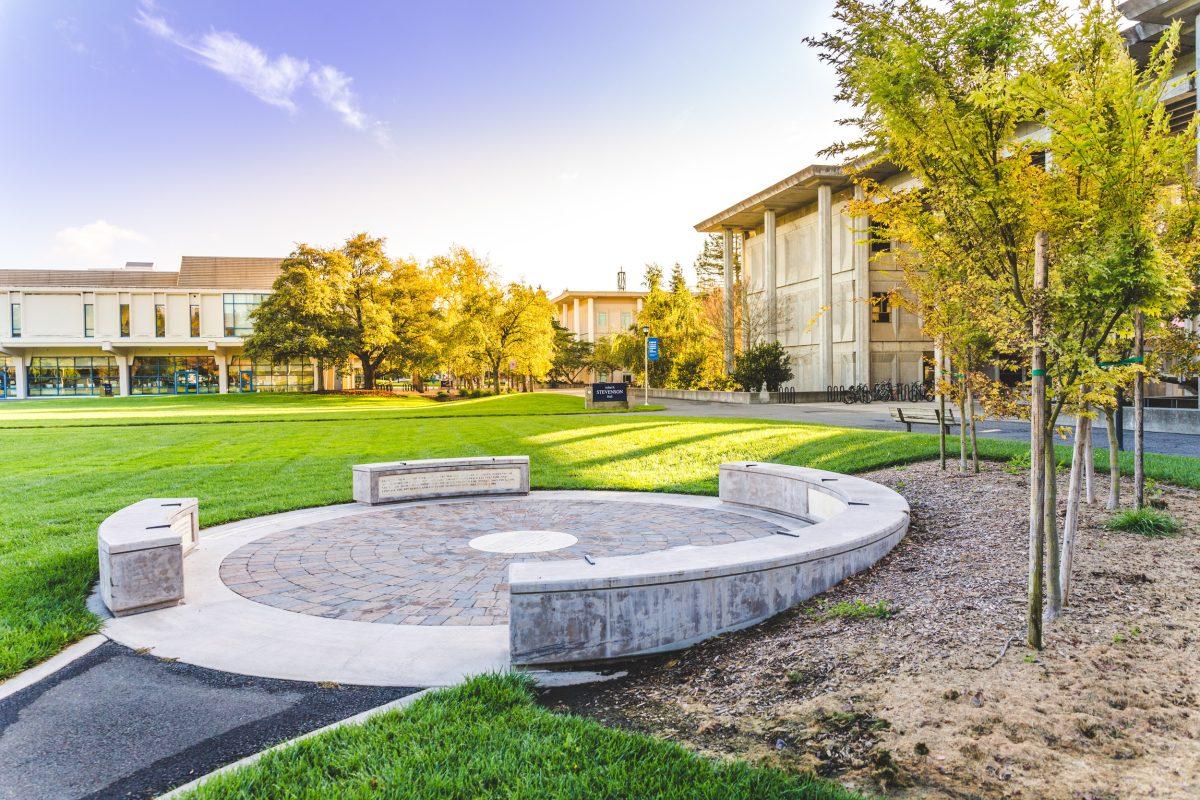In the 1960s the University of California, Berkeley was the birthplace of student activism and the Free Speech Movement. Among the founders of the movement was Mario Savio, a former Sonoma State University faculty member in his later years. Despite his passing in 1996, students at Sonoma State are still impacted by Savio and his beliefs.
The Mario Savio Speakers’ Corner is a memorial at Sonoma State commemorating his life and work, located near the corner of Stevenson and International Hall.
“Savio is one of those people that gave birth to activism, and put Berkeley on the map for demonstrations and protests empowering students,” said Sonoma State News and Media Relation spokesman Nicolas Grizzle.
“[Savio] was a student activist and protester at Berkeley. There was a time when students were not allowed any canvassing or any tables on campus, he thought it was a violation of the first amendment,” said Jonah Raskin, Sonoma State professor emeritus and longtime friend of Savio.
“He and a few other students protested and won the right to able to be active in politics. He also went to the South to register voters, that was a pivotal time in his life.”
Savio was remembered for a powerful speech he gave at a large protest at the University of California, Berkeley.
“There’s a time when the operation of the machine becomes so odious, makes you so sick at heart, that you can’t take part. You can’t even passively take part. You’ve got to put your bodies upon the gears and upon the wheels, upon the levers, upon all the apparatus, and you’ve got to make it stop,” Savio said in a 1964 speech at UC Berkeley. “You’ve got to indicate to the people who run it, to the people who own it, that unless you’re free, the machine will be prevented from working at all.”
Although everyone has the right to protest, not everyone chooses to demonstrate their beliefs. Many of the protests today wouldn’t be possible if it weren’t Savio.
“[Mario] would feel inspired about events that are happening today. This is what America is about. America was founded by revolutionaries, who believed in the first amendment, freedom of speech, the right to be protected [from] unreasonable searches and seizures [and] all those things in the Bill of Rights. He would be out there in the streets,” said Raskin.
According to the American Civil Liberties Union’s website, the right for citizens to peacefully assemble and protest is a necessary part of a functional democracy. When public expression is met with opposition from police or government, protesters should know their rights in order to protect themselves against unreasonable abuse.
“Human beings never get to the perfect state, there is always a place for protesting, it’s always happening. It will always happen. That is the nature of democracy, you have to do it, to have it,” said Raskin.
At many colleges and universities around the country students are engaging in protest over a variety of issues. Students are more willing to protest than in prior years, a trend that could relate to recent political and social unrest.
“He was an inspirational figure because what he was doing was not the norm at the time. When you’re the founder of a movement, it’s always a controversial and risky thing to take on because there’s not a whole lot of people you can look to that say this is how it’s been done and this is how it can be successful,” Grizzle said. “What he was doing was done out of necessity at the time. I can see the parallels [today] with the women’s march.”
“There are a lot of people that deserve credit, [Mario] would not say he was the only one. There are dozens and dozens people, [Robert George] Bobby Seale, Fred Hampton, Tom Hayden, Abbie Hoffman a whole lot of people, that also deserve credit for their contributions,” said Raskin. “He taught [mathematics and philosophy and] believed that education in the state of California should be free for everyone. He [was upset with] the increases in student fees and he was concerned about rights of immigrants.”
Raskin described Savio as passionate about both his work and students. Despite his time as an activist, in his later life Savio wanted to be a professor and often chose to dodge the spotlight.
For more information on demonstrating protester rights, visit the ACLU website at https://www.aclu.org.



































